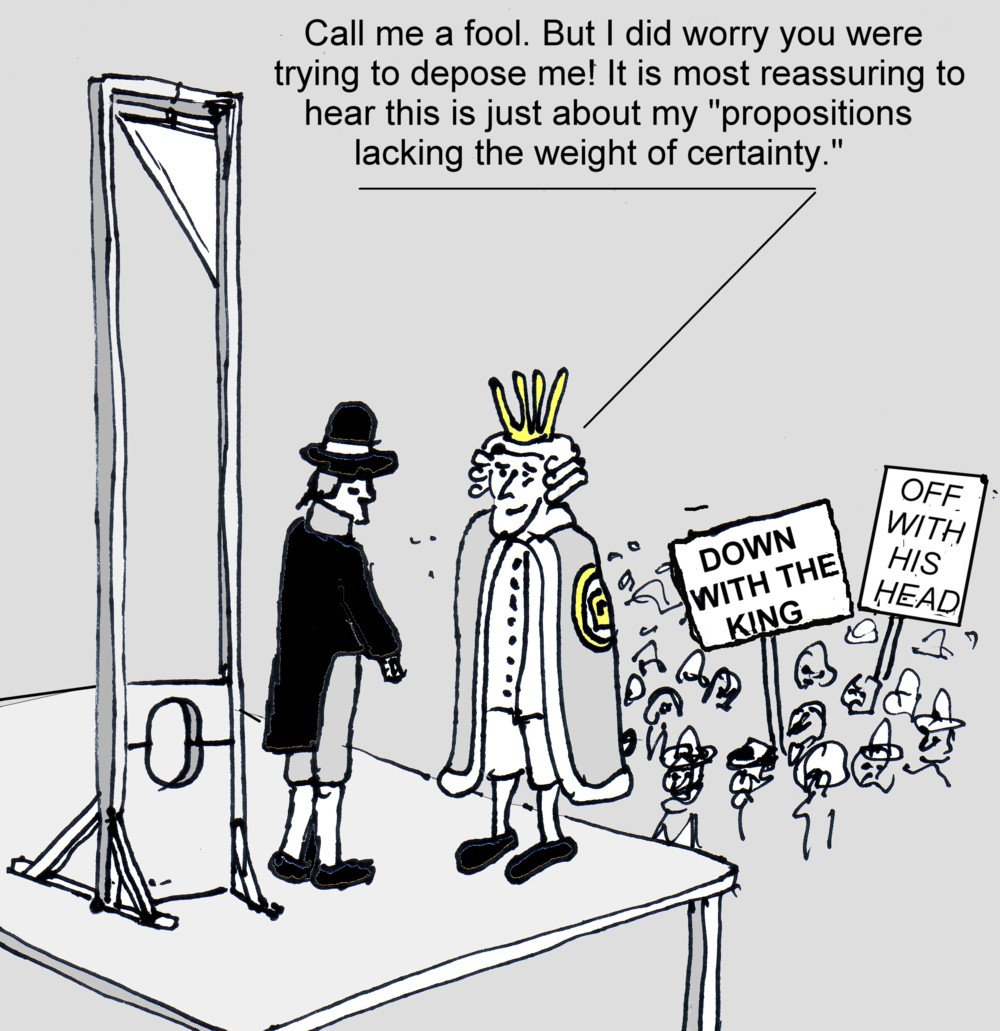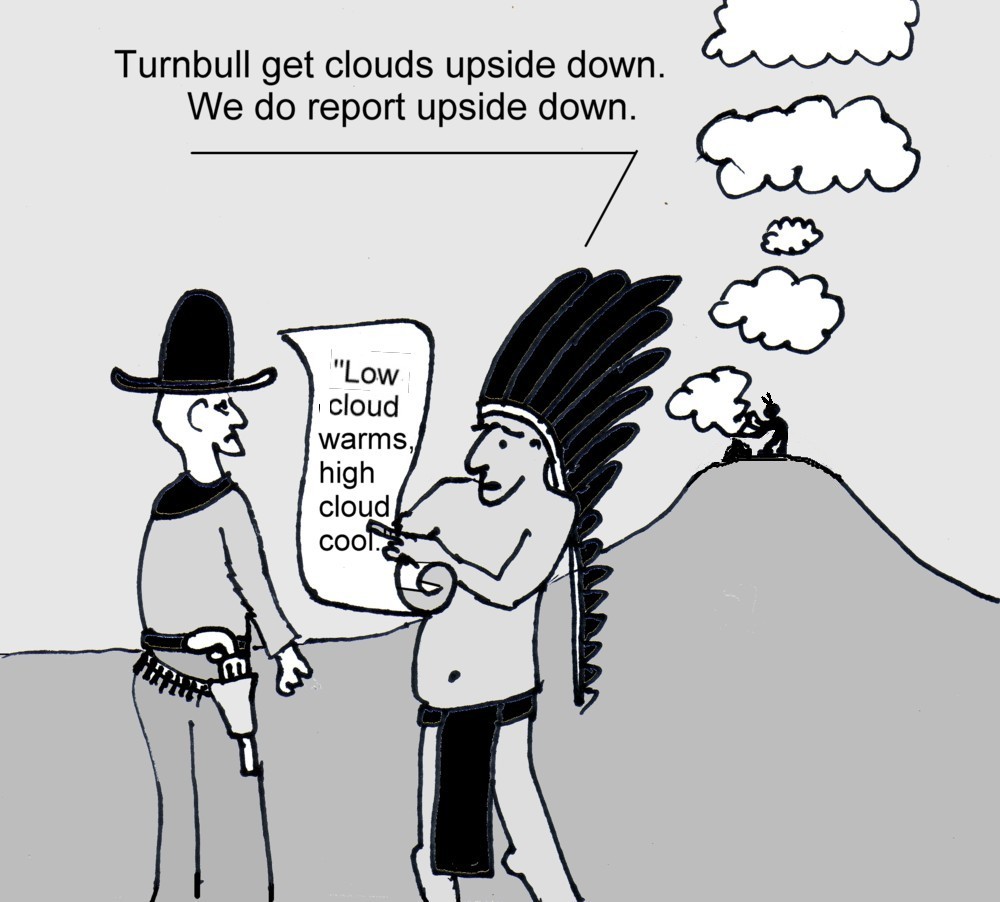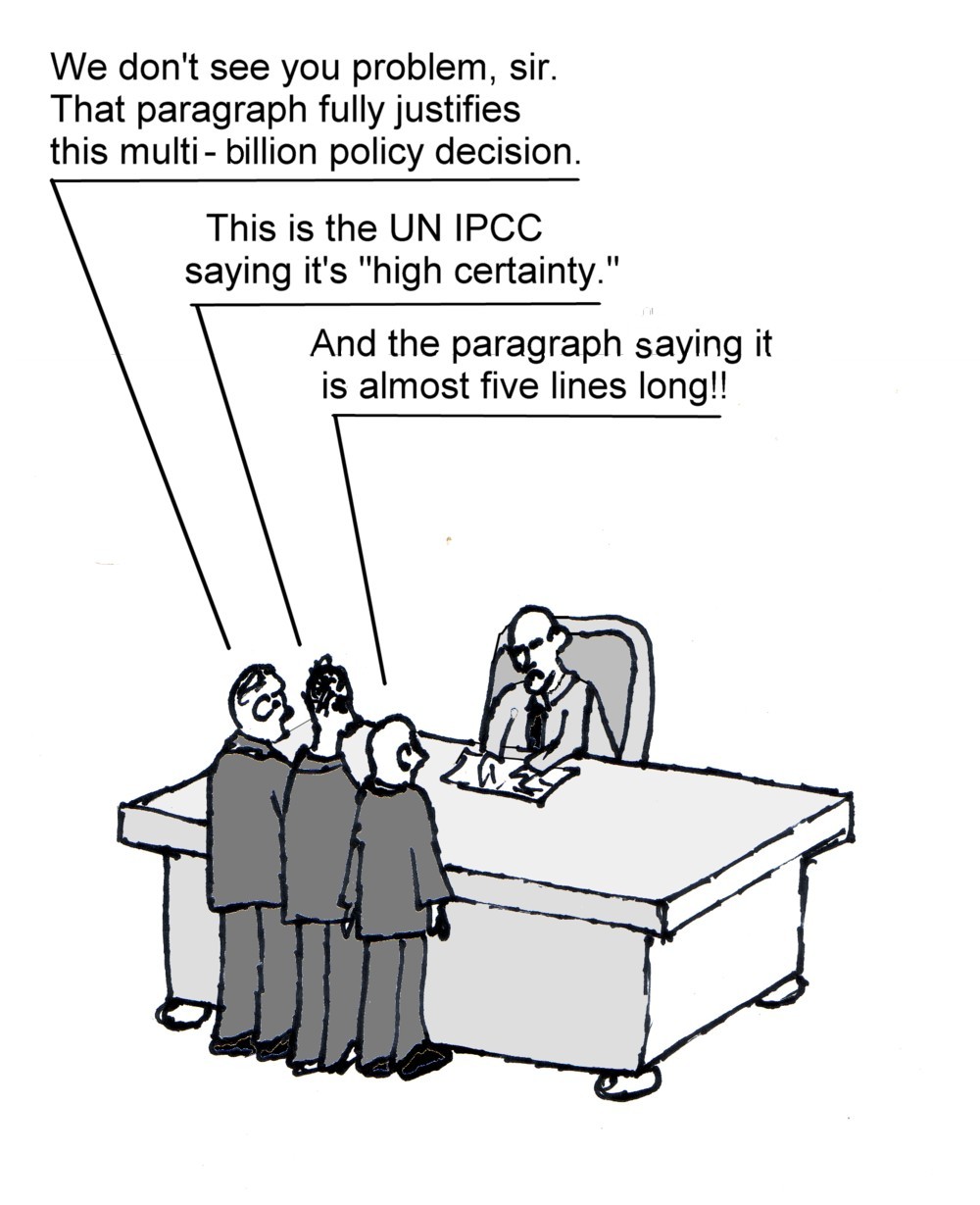This is the sixth post in a series examining the UK-registered educational charity and climate denial ‘think-tank’ Global Warming Policy Foundation (GWPF). Previous posts (1, 2, 3, 4, 5) have identified very serious shortcomings and it is now make-or-break time for the GWPF‘s reputation.
GWPF Briefing Paper No1 – ‘The Really Inconvenient Truth’ will be a good test for this because “the GWPF is proud to publish this dispassionate but devastating critique of UK climate change policies, and of the alleged basis on which those policies rest.”
So says the foreword written by Lord Lawson of Blaby, the founder of the GWPF. Such a statement pretty much overrules the disclaimer that appears on the cover of these Briefing Papers (that views expressed are those of the author not the GWPF).
So will GWPF pride come before a fall?
REALLY INCONVENIENT AND REALLY TRUE?
The author of Briefing Paper No1 is Lord Andrew Turnbull, a retire senior civil servant and a GWPF Trustee. Turnbull has a “unique authority” for the task according to Lord Lawson. But a “unique authority” may not be adequate because the subject of Briefing Paper No1 encompasses not just UK climate change policy, but also the entirety of the work of the UN IPCC. Now that is a whole lot of subject-matter!
The Really Inconvenient Truth which Turnbull attempts to convey is that the basis for UK climate policy is shaky because it rests solely on the IPCC‘s findings. “The propositions of the IPCC do not bear the weight of certainty with which they are expressed,” he says.
However Turnbull is at pains to describe what he is attempting in Briefing Paper No1. He wishes only to point out the doubts and flawed procedures that exist. He does not seek to “replace“ the IPCC “propositions” with alternative propositions.
That is what he says. But what does he then do?
The gargantuan task Turnbull tackles in Briefing Paper No1 requires a seriously focused analysis but there is none of that here. Briefing Paper No1 is a sweeping account of the subject that strongly advances alternative “propositions.”
In essence, Turnbull’s message is that “the IPCC view is a narrowly-based and over-simplified one … downplaying the role of natural forces.” The alternative view he advances sees a less dramatic climate change that would allow the world to adapt without reducing greenhouse gas emissions. Turnbull concludes (quoting the GWPF‘s inaugural lecture) that the IPCC view “is impossible to accept.”
Logic dictates this is a call for its “replacement.”
As already mentioned, Briefing Paper No1 analyses IPCC work in its entirety. It thus covers the science, the climatic impacts and the policy responses.
These will be examined here in reverse order – kind of upside-down.
1 POLICY RESPONSES
Turnbull argues at some length for what he calls “no regret” mitigation policies to reduce CO2 emissions, policies which would not impact greatly on the UK economy. Yet Turnbull is entirely disinterested in the CO2 reductions that such minimal policies would achieve. It really does beg the question why he argues for any mitigation policies at all.
Indeed he talks briefly of preferring “adaptation” policies, pointing to the Institute of Civil Engineers who allegedly think that too little attention is paid to “adaptation.” Confusingly, Turnbull gives no source for this allegation. So is he referring to the UK‘s Instsute of Civil Engineers? It is strange if he is. Their policy statements on climate change are unequivocal and wholly opposite to Turnbull’s allegation. This is true even in their 2008 statement Adapting the UK to Climate Change (whose title may have given rise to Turnbull’s confusion, perhaps a new take on ‘judging a book by its cover.‘).
2 CLIMATIC IMPACTS
Turnbull deals quickly with the IPCC work on climatic impacts. He calls it shabby and quotes twice the Inter Academy Council (IAC) Report 2010 on the IPCC. This time Turnbull’s source is referenced so there is no mistaking Turnbull’s misinterpretations.
Turnbull makes here two accusations.
Firstly he says the IAC strongly criticise the IPCC WG2 for using non-peer-reviewed material. On this Turnbull is wrong. The IAC say using such “gray” literature is “relevant and appropriate” and is only criticising particulars of how it is used!
Turnbull’s second quote (from the IAC Executive Summary) is about the IPCC‘s use of unsupported or unclear probability assessments within the WG2 Summary for Policy Makers. Any reader of this WG2 Summary will see it is only a summary. It’s probability statements are shoddy work but not the shabby underhand work of deception that Turnbull describes.
This second IAC quote is used to back up Turnbull’s otherwise unsupported accusations of “a consistent pattern of cherry-picking, exaggeration, highlighting extremes and failure to acknowledge beneficial effects.” Here Turnbull is entirely at odds with the IAC report which never makes any such comment or anything remotely in this vein.
Indeed the IAC begins its conclusions “The Committee concludes that the IPCC assessment process has been successful overall and has served society well” showing Turbull’s intemperate tirade against the IPCC WG2 is entirely preposterous!
3 THE SCIENCE
On the science, Turnbull concludes that the IPCC “sees calamity just around the corner, producing calls for dramatic and early CO2 reduction.” This is a blunt but fair assessment.
Yet Turnbull goes on to make many strong but largely unsupported accusations against the IPCC science. He says it ignores ‘huge controversy‘, relies on ‘unproven assumptions‘ since it ‘ ignored‘ certain possibilities. He says its findings have been ‘strongly challenged’ and cites “some scientists … many scientists” who hold alternative views. And for good measure Turnbull also rounds on the Hockey Stick curve, as did GWPF Briefing Paper No3.
None of this has any substance to it. The “many scientists” (in fact one misguided scientist working outside his specialism) was debunked in Part 5 of this series.
As for the “some scientists,” again only one of these is named – climate ‘skeptic’ Professor Richard Lindzen (who is a member of the GWPF‘s Academic Advisory Council). It is difficult to support the idea that Lindzen’s work has been ignored by the IPCC. Lindzen’s work contributed to the 2007 IPCC report within two different chapters and he was even a Lead Author in the 2001 IPCC report on the very chapter relevant to Turnbull’s comments.
While Turnbull makes no reference to any particular piece of work by Lindzen (and there continues to be a lot of that), it is safe to say that the available work relevant to Turnbull’s discussion had been already shown as entirely flawed scientifically well before Briefing paper No1 was published.
THE REALY INCONVENIENT TRUTH FOR TURNBULL & THE G.W.P.F.
Be it in the science, the climate impacts or the policy responses, there is but one good word that can be said about GWPF Briefing Paper No1 – it is consistent.
It is consistent in being always wrong!
The same appears to be the case generally with GWPF Briefing Papers which have all now been reviewed by this series – consistently wrong and entirely flawed.
The ‘debunking’ process could be continued to other GWPF publications, searching for the merest hint of some improvement in its reporting, some publications that might show at least some merit. But enough is enough.
GWPF is a UK-registered charity. If a UK charity uses controversial material “such material must be factually accurate and have a well-founded evidence base” (emphasis added). Yet all GWPF Briefing Papers have been shown to be riven with controversial material that is in no way factual or well-founded in evidence.
This is made worse because the charitable “purpose” of the GWPF is to “advance the public understanding of global warming and of its possible consequences, and also of the measures taken or proposed to be taken in response to such warming” (emphasis added).
For an educational charity to be spreading so much untruth and error is surely unacceptable, even scandalous. It is evidently a significant non-compliance that impacts on the public trust in UK charities generally. On this basis, a formal complaint will now be made and pursued with the UK Charity Commission.
There does also remain one as-yet unasked question.
Why would a bunch of respected and otherwise sensible people make such fools of themselves in this manner?
Subscribe to our newsletter
Stay up to date with DeSmog news and alerts











